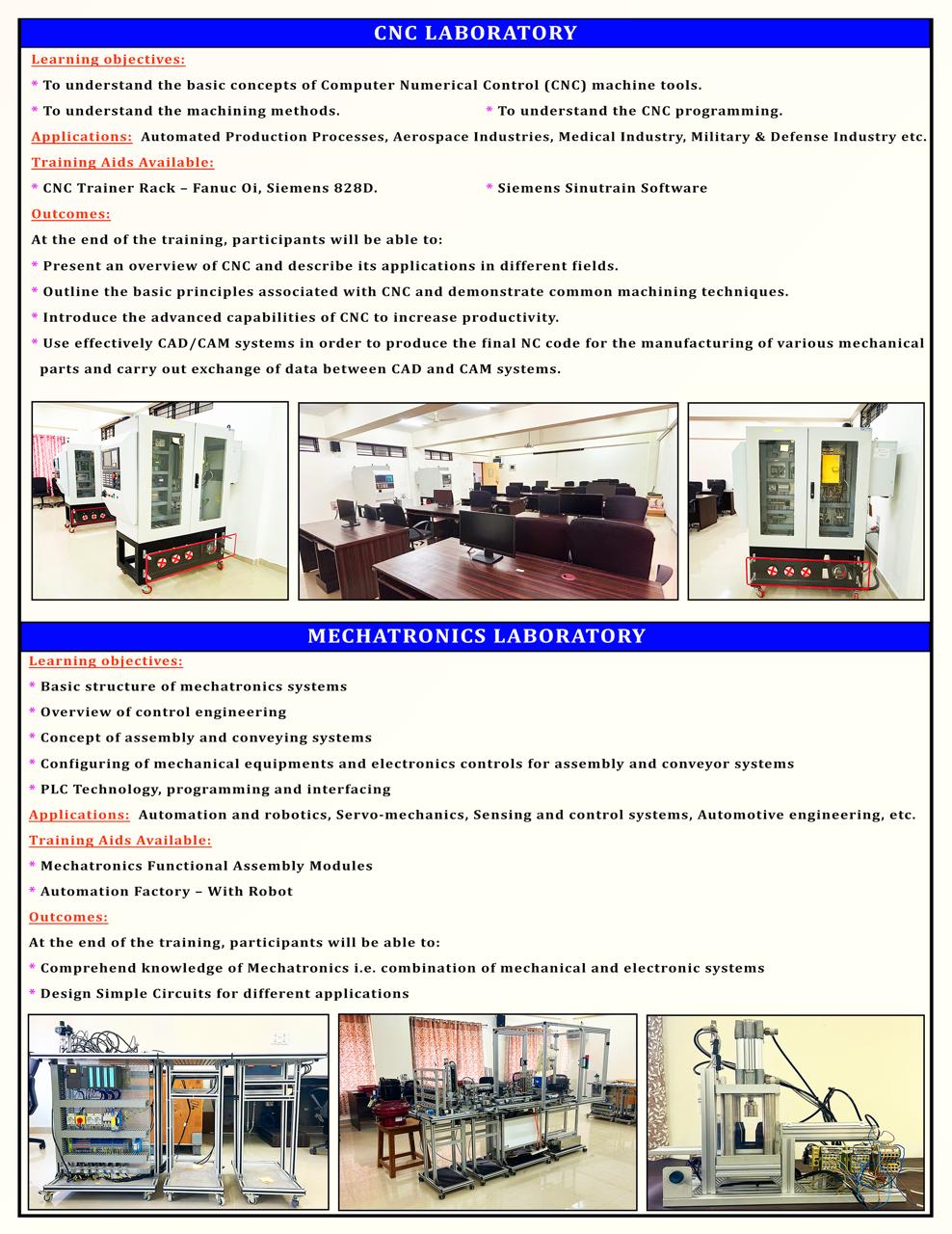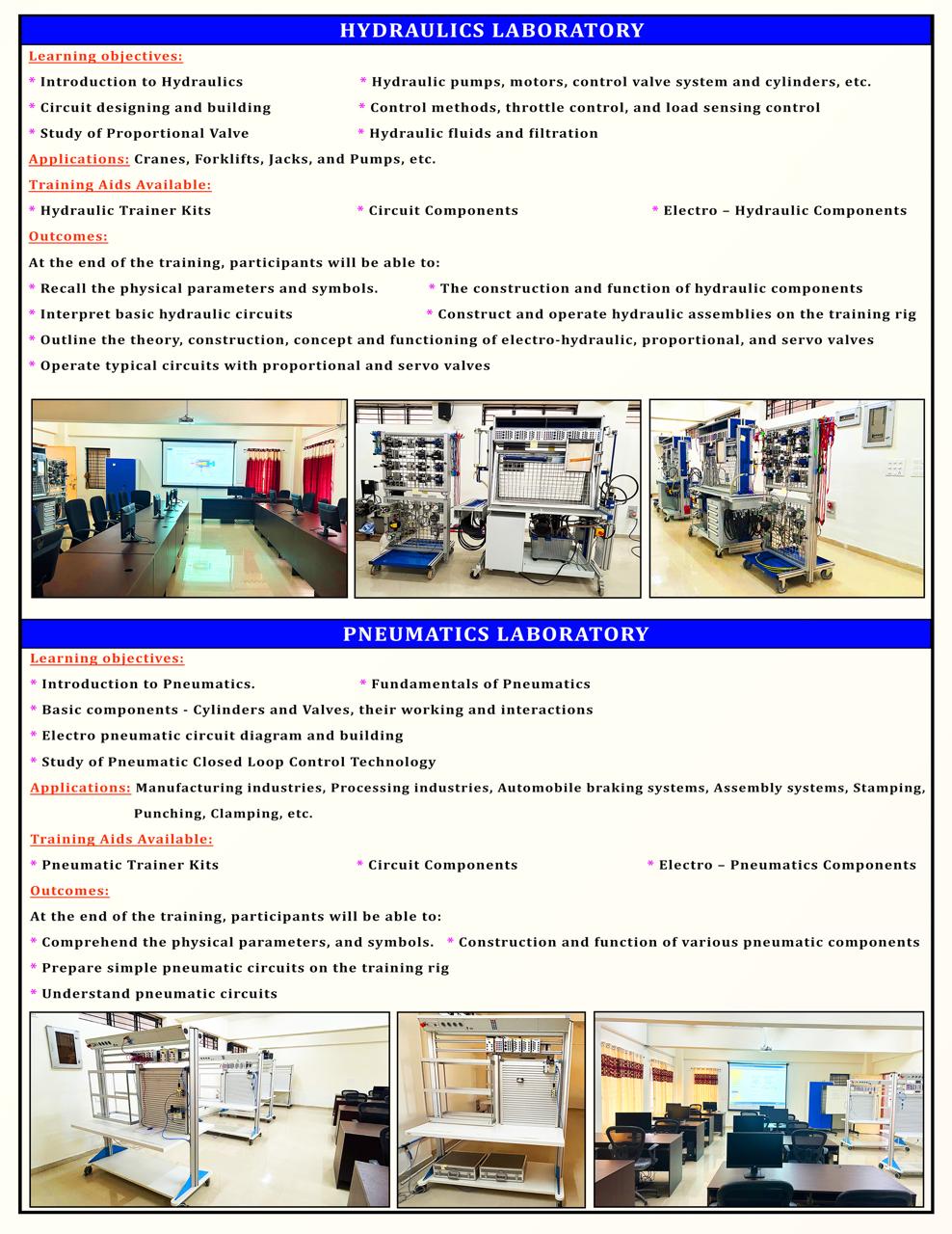-
Online Fees Payment
- Pay Now
About the Department
The B.E. program in "Robotics and Artificial Intelligence" is designed to cultivate expertise needed for implementing cutting-edge Industry 4.0 technologies across various industrial sectors. The curriculum is evenly balanced between Robotics and Artificial Intelligence courses. Robotics modules cover robot design, manufacturing, sensing, control, programming, and practical applications. Meanwhile, Artificial Intelligence courses delve into fundamental programming, Machine Learning, Big Data Analytics, Deep Learning, IT, and Communication Systems relevant to the Industrial Internet of Things (IIoT) context. Additionally, both Robotics and Artificial Intelligence components provide equal focus on practical laboratory training, preparing students to innovate and solve real-world challenges in today's industrial landscape.
Department Vision
To provide top-tier Robotics and Artificial Intelligence (AI) engineers, renowned for their professional competence and extensive qualifications. To meet the specific demands of industries and organizations through a commitment to excellence in teaching, learning, and research, ensuring that graduates are well-prepared to lead and innovate in their fields.
Department Mission
1.Providing top-tier education that prepares students to excel in the global engineering arena.
2.Improving teaching methods constantly to uphold academic excellence.
3.Tackling swiftly changing scientific and technological challenges in the fiercely competitive global context.
4.Cultivating ethics, integrity, honesty, credibility, and promoting social and environmental awareness among the students.
Program Education Objectives (PEO)
The graduate students will, after completion of 4 years of BE Civil Engineering Programme;
PEO1: Showcase proficiency in Robotics and Artificial Intelligence, applying them effectively in various domains.
PEO2: Innovate hardware solutions for Robotics and develop software solutions for integrating Artificial Intelligence into Robotics applications.
PEO3: Advance to higher academic pursuits for Research and Development in Robotics and Artificial Intelligence.
PEO4: Embrace lifelong learning, communicate proficiently, demonstrate leadership, and exhibit a strong commitment to professional ethics.
Program Outcomes (POs):
PO1: Engineering Knowledge: Apply mathematics, science, and engineering principles to solve complex engineering challenges.
PO2: Problem Analysis: Identify, formulate, and analyze engineering problems using fundamental principles from mathematics, natural sciences, and engineering literature.
PO3: Design/Development of Solutions: Design system components meeting specified requirements, considering health, safety, societal, and environmental factors.
PO4: Complex Problem Investigation: Utilize research-based methods to draw valid conclusions from experimental design and data analysis.
PO5: Modern Tool Usage: Employ contemporary engineering and IT tools effectively, including modeling and prediction, while understanding their limitations.
PO6: Engineering and Society: Evaluate societal, health, safety, legal, and cultural implications of engineering practices.
PO7: Environment and Sustainability: Understand and promote sustainable development principles in engineering solutions.
PO8: Ethics: Apply ethical principles and uphold professional responsibilities in engineering practice.
PO9: Individual and Teamwork: Function effectively in diverse teams and multidisciplinary settings, demonstrating leadership when required.
PO10: Communication: Clearly convey complex engineering concepts through reports, presentations, and instructions to various audiences.
PO11: Project Management and Finance: Apply engineering and management principles to lead and participate in diverse team projects.
PO12: Lifelong Learning: Recognize and engage in continuous independent learning to adapt to technological advancements and career development.
Program Specific Outcomes (PSOs):
PSO1: Design Robotic structures tailored for diverse applications and integrate control circuits using analytical, logical, and problem-solving skills to achieve targeted automation objectives.
PSO2: Develop sophisticated software systems to implement Artificial Intelligence in Robotic applications, enhancing adaptability and performance.
PSO3: Apply robotics and artificial intelligence expertise in industrial automation, service robotics, exoskeletons, surgical robotics, autonomous vehicles, delivery systems, and unmanned aerial vehicles, addressing real-world challenges in each domain.
Cources Offered:
1. BE: Robotics and Artificial Intelligence
INFRASTRUCTURE:
State of art smart class rooms
Laboratory facilities:
- Robotics laboratory
- Industrial Electronics and PLC laboratory
- CNC and 3D Printing laboratory
- Mechatronics laboratory
- Hydraulics and Pneumatics laboratory






